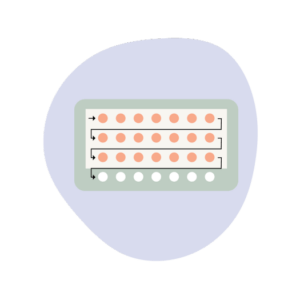
“The pill,” also known as combination birth control pills, are a type of oral contraceptive that help prevent pregnancy by combining two hormones: estrogen and progestin. In order for these pills to be effective, they need to be taken daily by mouth.
It’s worth noting that the inclusion of both estrogen and progestin in combination pills sets them apart from progestin-only pills, which are also referred to as the “mini-pill” and only contain a synthetic form of progestin.
And bonus, it can also make your periods less of a pain if they’re usually heavy or crampy. Double win!
In the U.S., you’ve got a lot of options when it comes to birth control pills. They typically differ in the specific types and amounts of estrogen and progestin they contain, as well as their packaging. Here are some common types of combination birth control pills:
The choice of which combination birth control pill is best for an individual depends on their specific needs, medical history, and potential side effects. It’s a good idea to chat with a healthcare provider. They’ll help you figure out what is right for you based on your needs, health, and what you prefer.
It’s important to follow their guidance and take the pills as directed for maximum effectiveness. To see a list of the brands we cover through our telehealth partner Twentyeight health click here.
The pill stops eggs from leaving your ovaries (called ovulation), so there’s no egg to fertilize. No egg to fertilize means you can’t get pregnant.
If you are looking to get birth control pills, the first thing you’ll need to do is schedule an appointment with a healthcare provider that prescribes birth control pills. Typically, combination birth control pills come in packs of 28 pills, with 21 active pills containing hormones and 7 inactive or placebo pills, and should be taken every day around the same time each day.
It’s crucial to follow your healthcare provider’s instructions and ask any questions you may have about the specific pill you’re prescribed. Additionally, inform your healthcare provider about any changes in your health or medications, as they can affect the pill’s effectiveness.
When it comes to birth control, there are pros and cons for each method, and remember, everyone’s body is unique, so what works for you might not be the same for your friends. The pill has been around for more than 50 years, and millions of people have used it safely. But, it’s a good idea to chat with your healthcare provider. They’ll help you figure out if it’s right for you based on your needs, health, and what you prefer.
STARTING OUT SIDE EFFECTS
Some people may experience side effects like nausea, breast tenderness, headaches, breakthrough bleeding, and changes in mood. These typically mellow out after a few months but might be bothersome for some.
When used correctly, birth control pills are super effective but it’s important to remember that they don’t protect you against sexually transmitted infections (STIs). To reduce the risk of getting or spreading STIs, it’s a good idea to use condoms every time you have sex, even if you have are on the birth control pill. We offer condoms mailed directly to anyone who is 18+ and lives or goes to school in our service area. Click here to request free condoms.
If you live or go to school in our 18-county service area and are looking for a birth control method, you can give us a call at 423-265-7837 or fill out our intake form and start the process yourself. If you want to speak with one of our Health Educators on the phone or if you’d like for us to call you back on a certain day to schedule an appointment for birth control, you can fill out the request form linked here, and we will call you back on your preferred date.
© A Step Ahead Chattanooga 2024 and website designed by Brightside Creates.
We collect cookies to analyze our website traffic and performance; we never share any personal data. View our Privacy Policy.